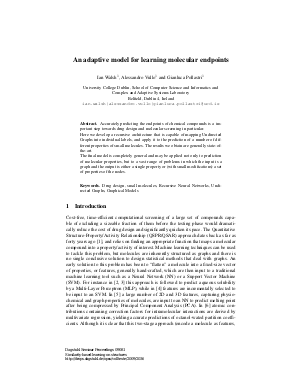An adaptive model for learning molecular endpoints
Authors Ian Walsh, Alessandro Vullo, Gianluca Pollastri
-
Part of:
Volume:
Dagstuhl Seminar Proceedings, Volume 9081
Part of: Series: Dagstuhl Seminar Proceedings (DagSemProc) - License:
 Creative Commons Attribution 4.0 International license
Creative Commons Attribution 4.0 International license
- Publication Date: 2009-06-23
File

PDF
DagSemProc.09081.3.pdf
- Filesize: 0.61 MB
- 16 pages
Document Identifiers
Subject Classification
Keywords
- Recursive neural networks
- qsar
- qspr
- small molecules
Metrics
- Access Statistics
-
Total Accesses (updated on a weekly basis)
0Document
0Metadata
Abstract
I will describe a recursive neural network that deals with undirected graphs, and its application to predicting property labels or activity values of small molecules. The model is entirely general, in that it can process any undirected graph with a finite number of nodes by factorising it into a number of directed graphs with the same skeleton. The model's only input in the applications I will present is the graph representing the chemical structure of the molecule. In spite of its simplicity, the model outperforms or matches the state of the art in three of the four tasks, and in the fourth is outperformed only by a method resorting to a very problem-specific feature.
Cite As Get BibTex
Ian Walsh, Alessandro Vullo, and Gianluca Pollastri. An adaptive model for learning molecular endpoints. In Similarity-based learning on structures. Dagstuhl Seminar Proceedings, Volume 9081, pp. 1-16, Schloss Dagstuhl – Leibniz-Zentrum für Informatik (2009)
https://doi.org/10.4230/DagSemProc.09081.3
BibTex
@InProceedings{walsh_et_al:DagSemProc.09081.3,
author = {Walsh, Ian and Vullo, Alessandro and Pollastri, Gianluca},
title = {{An adaptive model for learning molecular endpoints}},
booktitle = {Similarity-based learning on structures},
pages = {1--16},
series = {Dagstuhl Seminar Proceedings (DagSemProc)},
ISSN = {1862-4405},
year = {2009},
volume = {9081},
editor = {Michael Biehl and Barbara Hammer and Sepp Hochreiter and Stefan C. Kremer and Thomas Villmann},
publisher = {Schloss Dagstuhl -- Leibniz-Zentrum f{\"u}r Informatik},
address = {Dagstuhl, Germany},
URL = {https://drops.dagstuhl.de/entities/document/10.4230/DagSemProc.09081.3},
URN = {urn:nbn:de:0030-drops-20367},
doi = {10.4230/DagSemProc.09081.3},
annote = {Keywords: Recursive neural networks, qsar, qspr, small molecules}
}
